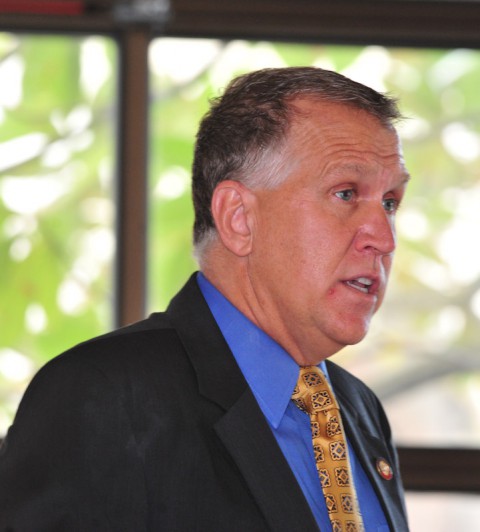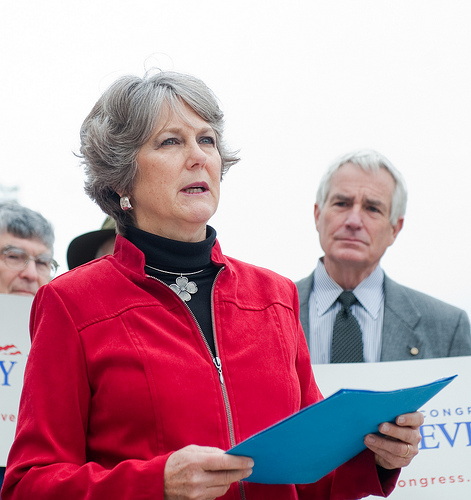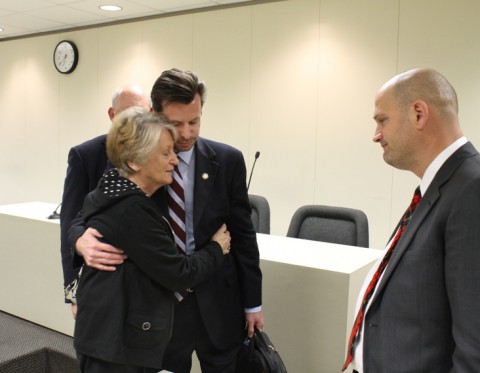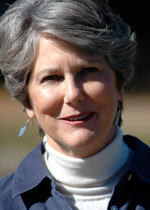N.C. Speaker of the House Thom Tillis spoke to the Council of Independent Business Owners in Asheville on March 22, updating them on the majority party’s accomplishments and goals.
(Photo by Bill Rhodes)

N.C. Speaker of the House Thom Tillis spoke to the Council of Independent Business Owners in Asheville on March 22, updating them on the majority party’s accomplishments and goals.
(Photo by Bill Rhodes)

The fate of the Asheville water system is back on the legislative docket; the state’s new billboard rules have moved to the court docket; a number of WNC officials have lined up behind WNC candidate for governor; and a steep redistricting price tag gets scrutinized.

A temporary restraining order is being requested today to keep the N.C. Department of Transportation from permitting vegetation removal—primarily trees—under new state rules that allow larger zones and clear-cutting in the public right-of-way by outdoor advertising agencies.
Opponents of the state’s new billboard law prepared a complaint and temporary restraining order request Feb. 29, 2012, in Wake County Superior Court. The legal action by Scenic NC, Inc., is aimed at keeping the N.C. Department of Transportation from permitting vegetation removal – primarily trees – in front of billboards and other outdoor advertising under new temporary rules set to take effect March 1.

At a Feb. 22 forum hosted by the Asheville-Buncombe County League of Women Voters, Dr. George Peery sought to contextualize new Western North Carolina political districts that have “spawned shocked incredulity, smug sentiments of justifiable payback, outrage, support, and baffled indifference,” he said.

The public weighed in on the fate of the city’s water system today, Feb. 23, with the majority telling a study group of four legislators that the utility should remain in the city’s hands. (In this photo, Asheville City Manager Gary Jackson and City council members Jan Davis, Esther Manheimer and Chris Pelly talk with Henderson County Commissioner Charles Messer. Photo by Bill Rhodes)

There are 8,000 billboards along North Carolina’s highways, and on March 1, all of them will be subject to a new state law that greatly expands their “viewing zone.” And for the first time in decades, that will mean clear cutting (up to 380 feet) in the state rights of way.
(Photo by Bill Rhodes)

Two of the three Democrats running for Congress in the 10th District spoke at a Feb. 17 meeting of the Democratic Women of Buncombe County. Asheville Mayor Terry Bellamy, Statehouse Rep. Patsy Keever and writer/musician Timothy Murphy are all hoping to be the Democrat that takes on Republican incumbent – and likely nominee – Rep. Patrick McHenry in the fall.

As various members of the N.C. General Assembly point their cars towards Raleigh for their — could it be? — eighth mini-session tomorrow, they carry the extra weight of a January poll that found only 19 percent approval from North Carolina voters for their last time together.

Kicking off what’s likely to be one of the most contentious local campaigns this year, former Democratic Rep. Jane Whilden announced Feb. 13 that she will challenge incumbent Republican Tim Moffitt to try to take back the N.C. House seat she lost to him in 2010.

The legislative study committee examining the Asheville water system’s fate will hold a public hearing here on Thursday, Feb. 23, at the WNC Agricultural Center.

Rep. Patsy Keever huddled with a group of supporters in downtown Asheville on Jan. 19 to formally announce her candidacy for Congress in the 10th District, which stretches from the mountains to Gaston County. Now she faces Asheville Mayor Terry Bellamy and a host of other Democratic challengers vying to be their party’s congressional nominee against Republican Rep. Patrick McHenry in the November election. Photo by Bill Rhodes.

The study committee reviewing the Asheville water system and contemplating its future begins its series of four meetings today in Raleigh. Audio of the 2 p.m. meeting will be live streamed.
(Photo by Bill Rhodes)

A Statehouse committee chaired by Buncombe Rep. Tim Moffitt convened in Raleigh Jan. 17 to question DENR officials and hear from residents near the former CTS electroplating facility on Mills Gap Road south of Asheville. Here, Moffitt embraces CTS neighbor Dot Rice, whose family’s spring was contaminated by hazardous chemicals used at the plant; numerous Rice family members have become gravely ill.

With constitutional arguments concerning the Jan. 4 and 5 convenings of the N.C. Legislature now in the court system and the next scheduled session a month away on Feb. 16, the legislative calendar is currently dense with committee activity. And three committees specifically affecting Asheville and Buncombe County are part of the out-of-session action.
On Jan. 11, Xpress Contributing Editor Nelda Holder sat down with Rep. Tim Moffitt and talked with him about Study Bill 925, which created a Statehouse committee charged with reviewing and, perhaps, determining the future of the Asheville water system.

The North Carolina League of Conservation Voters scored Buncombe County’s legislators on their environmental votes for 2011. Rep. Patsy Keever ranked among the most “green” members of the Statehouse, and Rep. Tim Moffitt among the least.

Hearings of the Legislature’s Metropolitan Sewerage/Water System Committee, headed by Buncombe County’s Rep. Tim Moffitt, are set to begin Jan. 23 in Raleigh. The study grew out of legislation filed by Moffitt that would have demanded “conveyance of a city water system to a metropolitan sewerage district” under certain conditions — conditions that happened to specifically match Asheville and Buncombe County.

State legislators and activists came together in a Biltmore Forest home last night, Dec. 8, to build support for redistricting reform in North Carolina.

Today, Dec. 8, at local bookstore Malaprops, Jane Pinsky (left) of the N.C. Coalition for Lobbying and Government Reform recognized Rep. Ray Rapp (center right) and several other Western North Carolina legislators who support redistricting reform. (photo by Max Cooper)

Armed with grim statistics on a cloudy day in Western North Carolina, Alexandra Sirota of the N.C. Budget and Tax Center introduced herself on Tuesday morning, Dec. 6, by saying, “Hopefully by the end, we won’t leave you with too much discouragement.”